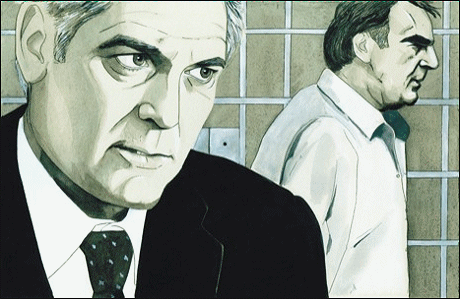“It’s forever being drummed into us that movies are a visual medium,” writes New Yorker critic David Denby. “Screenwriters are chastised with this half-truth all the time; they may be told to keep dialogue terse or suggestive or to drop lines altogether. After the movie is shot, directors may cut good as well as bad dialogue.”

But in Michael Clayton, director-writer Tony Gilroy “pitches us into a high-pressure world of law-firm shenanigans and corruption with irresistible relish, and the talk is copious, detailed, and both smart-assed and soulful.
“It takes a while to figure out who some of the players are and what, if anything, the big case and the London merger have to do with each other. Yet I’m not actually complaining — it’s all fascinating. Gilroy is an entertainer, and he wants to show us everything — dirty secrets held by prestige law firms, the moral squalor of big-time corporate power and what it does to people, the moments of conscience and decency in messed-up lives.
“[Gilroy is] good with actors, and Michael Clayton has pace and drive — it’s enormous fun. But I hope that as Gilroy continues directing he will let his movies breathe more. I was grateful for a single uncanny pause, in which Clooney, driving around Westchester on a wild night, stops at dawn, walks up a hill, and silently confronts three horses, as if they were the only instance of reason in a convulsive world. Gilroy holds the moment, but only for a moment.”












